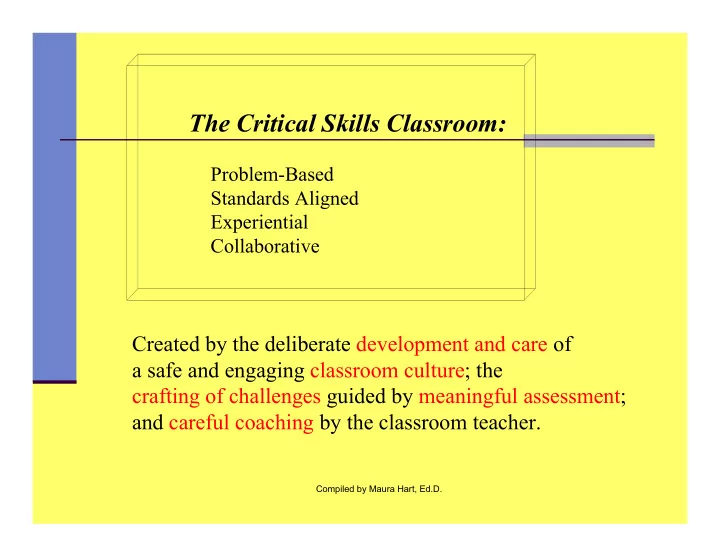

The Critical Skills Classroom: Problem-Based Standards Aligned Experiential Collaborative Created by the deliberate development and care of a safe and engaging classroom culture; the crafting of challenges guided by meaningful assessment; and careful coaching by the classroom teacher. Compiled by Maura Hart, Ed.D.
The History A Nation At Risk was published in 1982 by the Carnegie Institute, the content of which shook the foundations of public education in this country. In response Bill Southworth of New Hampshire formed a roundtable: Colleges and universities Charitable foundations Major corporations Parents Teachers students Compiled by Maura Hart, Ed.D.
The Question… What do people need … to know (essential knowledge), to be able to do (critical skills), and to be like (fundamental dispositions) to be successful in school and in life after school? A Critical Skills Program Presentation Compiled and Created by Maura Hart Compiled by Maura Hart, Ed.D.
Belief Statement We believe that education must be experiential, must nurture interdependence, and must enable all members of each generation to develop the judgment necessary to take responsibility for… The conduct of their lives The shaping of their society And the survival of the planet. We believe that judgment is the integration of knowledge, skills and standards of ethical behavior that guides the decisions, commitment and actions of all people. Compiled by Maura Hart, Ed.D.
The Basic Characteristics of a Critical Skills Classroom Students … frequently work as a team actively solve meaningful problems publicly exhibit their learning reflect on what they are learning and doing apply quality criteria to their work take responsibility for and ownership of their learning and for the classroom community Teachers … mediate, coach and support the learning process target learning results to guide culture, curriculum and assessment Work is interconnected Compiled by Maura Hart, Ed.D.
Skills Critical to the Needs of the Times Skillful problem solvers capable of developing effective solutions to the multi- dimensional and complex problems present in both personal and professional areas; Are capable decision makers who make responsible decisions in diverse situations; Routinely and effectively apply critical thinking in a range of life roles; Think creatively to enhance both life experience and results; Skillful communicators who express themselves with clarity and authenticity; Can efficiently and productively organize time, space, materials and tasks; Can skillfully help others to optimize their work together through effective management; Can recognize quality leadership and can assume it when appropriate. Compiled by Maura Hart, Ed.D.
Fundamental Dispositions Are responsible and invested owners of life-long learning; Are reflectively self-directed with a strong work ethic; Have a well developed internal model of quality work; Are trustworthy, have integrity and are of ethical character; Seek to optimize work through collaboration; Demonstrate a sense of curiosity and wonder; Are responsible and active members of communities. Compiled by Maura Hart, Ed.D.
In a Critical Skills Classroom Learning is problem-based and experiential; Standards and outcomes drive the work; Work is collaborative; Knowledge, skills and dispositions are developed; Activities are connected; Reflection is elemental; Work is publicly exhibited; Standards of quality criteria surround everything; Teachers facilitate learning; Students actively participate in their learning. Compiled by Maura Hart, Ed.D.
In the Critical Skills Classroom… Curriculum is transformed into problem-based challenges which are linked together and have relevance to the outside world. Student accountability is developed through a multitude of assessments which are performance based. Accountability is also fostered through public exhibition of knowledge. Students are coached to continuously engage in their learning by working to quality criteria, engaging in collaboration and reflecting on their learning. There are three dimensions of learning occurring at all times in the Critical Skills Classroom: Knowledge, Skills & Dispositions Compiled by Maura Hart, Ed.D.
The Role of Teacher as Coach: Craft challenges Act as a model Encourage Motivate Have high expectations Expect success Allow students to find answers Structure interactions Develop rituals and traditions Provide tools Build a common language Compiled by Maura Hart, Ed.D.
The Role of Student as Learner: Actively solve problems Publicly exhibit their knowledge Actively reflect on what they are doing Focus on standards of quality Have roles, rights and responsibilities Are held accountable for their actions Use common language, rituals and traditions, Work as a team Compiled by Maura Hart, Ed.D.
Bloom’s Taxonomy High Retention Evaluation Synthesis Analysis Application Comprehension Knowledge Low Retention Compiled by Maura Hart, Ed.D.
Ted Sizer’s Important Habits Perspective Analysis Imagination Empathy Communication Commitment Humility Joy Compiled by Maura Hart, Ed.D.
The Critical Skills Classroom and Current Theory and Best Practice Learning styles Mcarthy Targeting and Aligning with Common Core Multiple Intelligences Howard Gardner Curriculum Mapping Heidi Hayes Jacobs Frameworks for Teaching Charlotte Daniels Dewey, Montessori, Vygotsky, Likona Interdisciplinary teaching and thematic units Formative & Authentic Assessment Wiggins and McTighe Multi-age classrooms Brain-based research Ted Sizer’s “Necessary Habits” Maslow’s Hierarchy of Needs Block and flexible scheduling Bloom’s Taxonomy Compiled by Maura Hart, Ed.D.
Problem-based Connected Challenges Experiences Designed Toward Standards of Knowledge • Common Core • Developing independent learners • High quality, flexible workers • Brain-based learning • Higher order thinking • Constructivism • Performance-based & • Formative Assessment • Problem solving • Hands on learning • Applied learning Experience in a Collaborative Learning Community • Positive Culture & Climate • Anti- Bullying & Harassment • Learning styles • Multiple intelligences • Reflection/Meta-cognition Compiled by Maura Hart, Ed.D.
For More Information: www.antiochne.edu/acsr ACSR@antioch.edu 603.283.2302 Follow us at CriticalSkills1
Recommend
More recommend